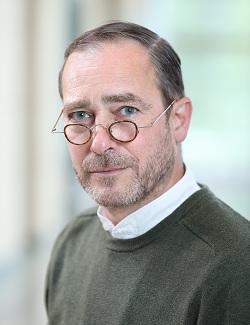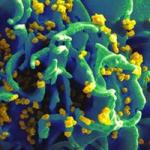
Research Topics
The Human Immunology Section (HIS) studies the processes that determine the course of human diseases in which the immune system plays a central role in their pathogenesis and outcome. We take a systems biology approach to generate multi-scale datasets. Our overriding philosophy is to address questions of human disease directly in humans and use the knowledge gained to initiate clinical studies of new therapeutic and vaccine approaches.
Our studies of HIV explore the cellular and molecular mechanisms by which the virus is acquired and disease progression is maintained, with an emphasis on host genetic and microbiological factors that render an individual vulnerable to infection. We explore the relationships among target cell types and availability as the reservoir for HIV, systemic inflammation, lymphoid tissue architecture, the gastrointestinal mucosal barrier and the individual's 'pathogen burden' in determining the rate of disease progression. We extend our understanding of the relationship between the host microbiome, systemic inflammation and immune system functionality to other infectious and non-infectious disease states and responses to vaccination.
Another major aspect of our work is to explore T cell and B cell receptor repertoire diversity in infectious disease and cancer. We have pioneered methods for next-generation sequencing and bioinformatic analysis of TCR and Ig repertoires, and high throughput isolation and functional testing of antigen-specific TCRs and Igs.
The laboratory is also performing virus discovery and global immune analysis of targeted human cohorts to detect reactivity against viruses which are potential pandemic threats. The premise of this project is to use virologic and immunologic screening for the discovery of tangible immunobiological countermeasures and to provide a platform to pre-emptively generate reagent and data resources for early detection and diagnosis.
Biography
Dr. Douek studied medicine at the Universities of Oxford and London, receiving academic scholarships from both institutions. He then practiced internal medicine and became a Member of the Royal College of Physicians (London) in 1993. He was awarded a Wellcome Trust Clinical Graduate Training Fellowship to pursue a Ph.D. in immunology at the University of London, which he earned in 1997. He completed his postdoctoral work at the Rockefeller University and the University of Texas Southwestern Medical Center, Dallas, where he was named assistant professor in infectious diseases (2000). While a postdoctoral fellow with Dr. Richard Koup, he developed the “TREC assay” to measure thymic output in humans. Dr. Douek was appointed to a tenure-track position in the Vaccine Research Center (VRC) Laboratory of Immunology in November 2000. Dr. Douek brought impressive academic credentials, training, and experience to the VRC and is internationally recognized in the fields of basic immunology, HIV, and transplantation biology. He was converted to a tenured senior investigator position in February 2007, the year in which he was presented with the World AIDS Day Award. He serves as chief of the Human Immunology Section at the VRC.
Selected Publications
- Gagne M, Flynn BJ, Andrew SF, Marquez J, Flebbe DR, Mychalowych A, Lamb E, Davis-Gardner ME, Burnett MR, Serebryannyy LA, Lin BC, Ziff ZE, Maule E, Carroll R, Naisan M, Jethmalani Y, Pessaint L, Todd JM, Doria-Rose NA, Case JB, Dmitriev IP, Kashentseva EA, Ying B, Dodson A, Kouneski K, O'Dell S, Wali B, Ellis M, Godbole S, Laboune F, Henry AR, Teng IT, Wang D, Wang L, Zhou Q, Zouantchangadou S, Van Ry A, Lewis MG, Andersen H, Kwong PD, Curiel DT, Roederer M, Nason MC, Foulds KE, Suthar MS, Diamond MS, Douek DC, Seder RA. Mucosal adenovirus vaccine boosting elicits IgA and durably prevents XBB.1.16 infection in nonhuman primates. Nat Immunol. 2024;25(10):1913-1927.
- Milner JD, Brenchley JM, Laurence A, Freeman AF, Hill BJ, Elias KM, Kanno Y, Spalding C, Elloumi HZ, Paulson ML, Davis J, Hsu A, Asher AI, O'Shea J, Holland SM, Paul WE, Douek DC. Impaired T(H)17 cell differentiation in subjects with autosomal dominant hyper-IgE syndrome. Nature. 2008;452(7188):773-6.
- Brenchley JM, Price DA, Schacker TW, Asher TE, Silvestri G, Rao S, Kazzaz Z, Bornstein E, Lambotte O, Altmann D, Blazar BR, Rodriguez B, Teixeira-Johnson L, Landay A, Martin JN, Hecht FM, Picker LJ, Lederman MM, Deeks SG, Douek DC. Microbial translocation is a cause of systemic immune activation in chronic HIV infection. Nat Med. 2006;12(12):1365-71.
- Nganou-Makamdop K, Talla A, Sharma AA, Darko S, Ransier A, Laboune F, Chipman JG, Beilman GJ, Hoskuldsson T, Fourati S, Schmidt TE, Arumugam S, Lima NS, Moon D, Callisto S, Schoephoerster J, Tomalka J, Mugyenyi P, Ssali F, Muloma P, Ssengendo P, Leda AR, Cheu RK, Flynn JK, Morou A, Brunet-Ratnasingham E, Rodriguez B, Lederman MM, Kaufmann DE, Klatt NR, Kityo C, Brenchley JM, Schacker TW, Sekaly RP, Douek DC. Translocated microbiome composition determines immunological outcome in treated HIV infection. Cell. 2021;184(15):3899-3914.e16.
- Douek DC, Brenchley JM, Betts MR, Ambrozak DR, Hill BJ, Okamoto Y, Casazza JP, Kuruppu J, Kunstman K, Wolinsky S, Grossman Z, Dybul M, Oxenius A, Price DA, Connors M, Koup RA. HIV preferentially infects HIV-specific CD4+ T cells. Nature. 2002;417(6884):95-8.
Related Scientific Focus Areas


Molecular Biology and Biochemistry
View additional Principal Investigators in Molecular Biology and Biochemistry



This page was last updated on Wednesday, July 16, 2025